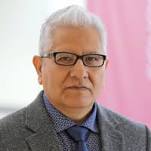- Email:
- scoronel@indiana.edu
- Campus:
- IU Bloomington

Serafín M. Coronel-Molina is an Indigenous scholar and native speaker of Huanca Quechua, an endangered variety spoken in the central highlands of Peru. Dr. Coronel-Molina is currently Professor of Literacy, Culture, and Language Education in the Department of Curriculum and Instruction at Indiana University Bloomington. He held a Named and Endowed Title of Indiana University Bicentennial Professor from 2019 to 2021. He is a sociolinguist, educational linguist, lexicographer, editor, translator, and activist. He delivered lectures and presented papers around the world. His research appears in numerous book chapters published by Cambridge University Press, Oxford University Press, Routledge, Multilingual Matters, Wiley-Blackwell, Springer, SAGE, Wilson, Cambridge Scholars Publishing, UNESCO, Nova Science Publishers, among others. Dr. Coronel-Molina’s research also appears in several top international journals. In addition, he was a Guest Editor/Co-Editor for the following Special Issues:(1) Language Contact and Universal Grammar in the Andes (2012, Lingua);(2) Translingual Literacies (2017, Journal of Multilingual and Multicultural Development);(3) Indigenous Language Regimes in the Americas (2017, International Journal of the Sociology of Language);(4) The Politics of Language (2017, Chiricú Journal: Latina/o Literatures, Arts, and Cultures);(5) New Frameworks for Language Revitalization in the 21st Century: Case Studies from the Americas and Europe (2021, Journal of Multilingual and Multicultural Development).He is the author of the Best Seller Quechua Phrasebook & Dictionary (2019, 5th Edition, Lonely Planet), and of a book on Language Ideology, Policy and Planning in Peru (2015, Multilingual Matters), and co-editor of Indigenous Language Revitalization in the Americas (2016, Routledge). He is about to complete a co-authored book manuscript titled Classroom Ethnography: Theory and Practice to be submitted to Multilingual Matters. Dr. Coronel-Molina’s research and scholarship explore the multiple and complex intersections of languages, cultures, ideologies, power, politics, policies, and identities in the Andes, the Americas and Asia more generally. This interdisciplinary and transdisciplinary focus broadens the horizon of his research and makes it relevant to the fields that contribute to his theoretical foundations, such as educational linguistics, sociolinguistics, linguistic anthropology, Indigenous Studies, Latin American studies, and Literacy Studies. His scholarship is divided into five major strands: language policy and planning, sociolinguistics, language revitalization, and translingual literacies.
Institute for Indigenous Knowledge
Center for the Documentation and Revitalization of Indigenous Languages
422 N. Indiana Ave.
Bloomington, IN 47405
iik@iu.edu
812-855-4086